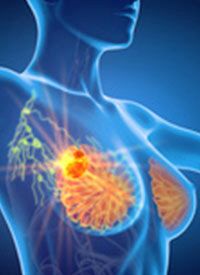Article
Trastuzumab Deruxtecan With or Without Pertuzumab Demonstrates Early Safety and Efficacy Signals in HER2+ MBC
Author(s):
Trastuzumab deruxtecan, both as monotherapy and in combination with pertuzumab, displayed encouraging efficacy with no new safety signals among patients with HER2-positive metastatic breast cancer, according to findings from the dose expansion part of the phase 1b/2 DESTINY-Breast07 trial.

Fam-trastuzumab deruxtecan-nxki (Enhertu), both as monotherapy and in combination with pertuzumab (Perjeta), displayed encouraging efficacy with no new safety signals among patients with HER2-positive metastatic breast cancer (MBC), according to findings from the dose expansion part of the phase 1b/2 DESTINY-Breast07 (NCT04538742) presented during the 2022 San Antonio Breast Cancer Symposium.
With a median follow-up of 11 months, patients achieved an unconfirmed objective response rate (ORR) of 87.0% (80% CI, 73.2%-95.1%) and a confirmed ORR of 69.6% (80% CI, 54.1%-82.2%) in the monotherapy module (n = 23). Those who were assigned to the trastuzumab deruxtecan plus pertuzumab module (n = 22) had a median follow-up of 10 months and achieved an unconfirmed ORR of 81.8% (80% CI, 66.9%-91.8%) and a confirmed ORR of 72.7% (80% CI, 57.0%-85.0%). The median duration of treatment was 9.1 months (range, 0.7-13.2) and 9.2 months (range, 0.9-13.5).
In addition to exploring the safety and tolerability of trastuzumab deruxtecan as a monotherapy and in combination with pertuzumab, DESTINY-Breast07 is also evaluating combinations of trastuzumab deruxtecan with paclitaxel, durvalumab (Imfinzi), durvalumab plus paclitaxel, and tucatinib (Tukysa) in the randomized dose-expansion phase of the trial. Secondary end points included ORR, progression-free survival, time to second disease progression, duration of response, overall survival, pharmacokinetics, and antidrug antibodies to the agents in the study.
In addition to exploring the safety and tolerability of trastuzumab deruxtecan as a monotherapy and in combination with pertuzumab, DESTINY-Breast07 is also evaluating combinations of trastuzumab deruxtecan with paclitaxel, durvalumab (Imfinzi), durvalumab plus paclitaxel, and tucatinib (Tukysa) in the randomized dose-expansion phase of the trial. Secondary end points included ORR, progression-free survival, time to second disease progression, duration of response, overall survival, pharmacokinetics, and antidrug antibodies to the agents in the study.
No grade 3 or higher nausea or vomiting adverse events (AEs) were reported and interstitial lung disease/pneumonitis was experienced by 1 patient with trastuzumab deruxtecan given as a single agent. One patient died from disease progression in the monotherapy module and 1 patient died from disease in the combination module.
The safety profiles of the agents were similar to those previously reported and all patients experienced any-grade AEs in the trastuzumab deruxtecan and trastuzumab deruxtecan plus pertuzumab groups. The most common for the groups, respectively, included the following: nausea (73.9% vs 63.6%), alopecia (47.8% vs 36.4%), vomiting (34.8% vs 40.9%), diarrhea (26.1% vs 63.6%), anemia (21.7% vs 36.4%), and COVID-19 infection (17.4% vs 40.9%). Grade 3 or higher events were reported in 30.4% of patients in the monotherapy module and the 40.9% in the combination module and serious AEs occurred in 8.7% and 13.6% of patients, respectively.
Another AE of interest was left ventricular dysfunction, which 2 patients in the monotherapy group experienced.
As part of the study methods, preclinical assessment using live cell imaging showed that when combined with pertuzumab, trastuzumab deruxtecan was internalized more rapidly and effectively. The authors also noted, “Trastuzumab deruxtecan combined with pertuzumab showed a greater reduction in total HER2 protein in cell lysate immunoblotting and enhanced internalization in HER2 expressing cells than with either drug alone.”
Treatment remains ongoing for 73.9% of patients in the trastuzumab deruxtecan module and for 72.7% of patients in the trastuzumab deruxtecan plus pertuzumab module. Therapy was discontinued by 26.1% and 27.3% of patients, respectively for the following reasons: AEs (8.7% and 13.6%), objective disease progression (4.3% and 9.1%), withdrawal by patients (8.7%, 4.5%), and lost to follow-up (4.3% and 0%).
The median age in the study was 53.4 years (range, 34-80) in the monotherapy module and 53.2 years (range, 33-75) in the combination module. Most patients in the trastuzumab deruxtecan monotherapy and combination modules had a hormone receptor status of estrogen receptor (ER)–negative and progesterone receptor (PR)–negative (47.8% and 40.9%, respectively). Additionally, ER–positive and PR–negative (17.4% and 18.2%), ER–positive and PR–positive (34.8% and 36.4%), were reported. Additionally, one patient (4.5%) had a status of ER–negative and PR–positive in the combination module.
HER2-positive status as assessed by immunohistochemistry (IHC) was IHC 3+ among 73.9% of patients in the monotherapy module and 86.4% in the combination module. IHC 2+/in situ hybridization–positive in 21.7% and 9.1% of patients, respectively. One patient in each module had missing status.
Patients did not receive any lines of therapy for advanced or metastatic disease and did not have brain metastases or previously treated stable brain metastases. Patients received trastuzumab deruxtecan at a dose of 5.4 mg/kg every 3 weeks and pertuzumab was given at 420 mg every 3 weeks with a loading dose of 840 mg.
Investigators noted that these results supported the use of trastuzumab deruxtecan monotherapy as well as in combination with pertuzumab in larger trials such as the ongoing DESTINY-Breast09 (NCT04784715); however, as this trial is still ongoing and the follow-up duration was relatively short, the results may evolve further.
Reference
Hamilton EP, Jhaveri KL, Loi S, et al. Dose-expansion study of trastuzumab deruxtecan as monotherapy or combined with pertuzumab in patients with metastatic human epidermal growth factor receptor 2-positive (HER2+) breast cancer in DESTINY-Breast07 (DB-07). Presented at: 2022 San Antonio Breast Cancer Symposium; December 6-10, 2022; San Antonio, TX. Abstract PD18-11.









